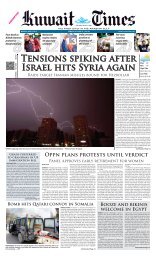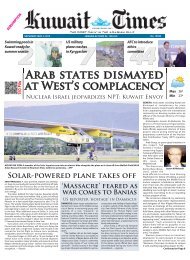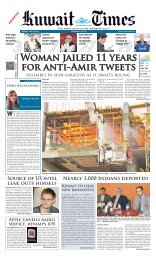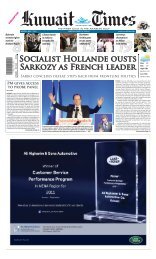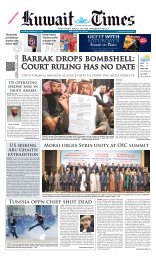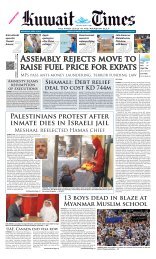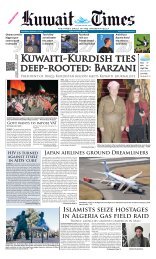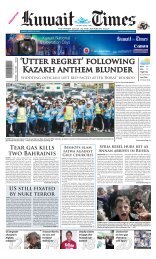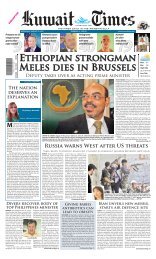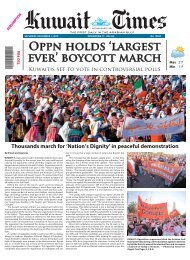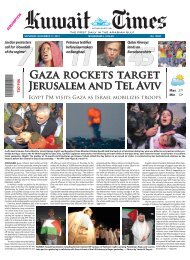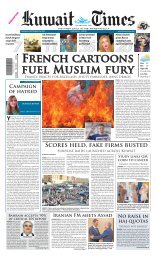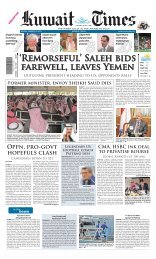You also want an ePaper? Increase the reach of your titles
YUMPU automatically turns print PDFs into web optimized ePapers that Google loves.
FRIDAY, AUGUST 31, 2012<br />
ABU DHABI: BP losing the chance to<br />
bid to maintain its major role in the<br />
United Arab Emirates oil sector may<br />
signal not just irritation with the British<br />
flagship company, but a more serious<br />
rift caused by frustration with UK policies<br />
and even broadcasts from<br />
London.<br />
Perceived BP haughtiness, anger<br />
over the West’s support for the Arab<br />
Spring and a growing sense that the<br />
UAE’s future lies in stronger ties with<br />
Asia, may have all driven the decision<br />
to block the oil major from bidding to<br />
run its biggest onshore oil fields, several<br />
well-placed sources in the UAE said.<br />
British business has basked in the<br />
Gulf sun since a protection deal with<br />
local rulers in 1820. BP has played a<br />
role in the development of its oil from<br />
the start in the early 1930s. But the<br />
West’s support for revolutions that<br />
toppled Arab leaders in 2011 and concern<br />
in Gulf states it is too welcoming<br />
of the Islamists who replaced them,<br />
has worn Britain’s centuries-old ties<br />
particularly thin, sources close to the<br />
matter say.<br />
“There was some tension between<br />
the two governments,” an industry<br />
source in Abu Dhabi told Reuters, without<br />
elaborating. “BP is looking for ways<br />
to mend this relationship,” he said,<br />
adding that attempts by the company<br />
to repair the rift with top UAE officials<br />
had been rebuffed.<br />
Three other sources close to the<br />
matter said BP had been frozen out<br />
from the pre-qualification stage for the<br />
onshore fields in part due to “tensions”<br />
between the UAE and London. UAE<br />
foreign ministry officials were not<br />
available for comment. A spokesman<br />
for Britain’s Foreign Office said only<br />
that he was aware of reports that BP<br />
has been sidelined.<br />
The UAE is Britain’s largest export<br />
market in the Middle East with construction,<br />
defence and education<br />
among the key sectors, according to<br />
UK Trade & Investment. In 2011, civil<br />
exports came to around 4.7 billion<br />
British pounds. A further factor cited<br />
by several sources in the UAE and<br />
London, is that a BBC Arabic report<br />
earlier this year on a government<br />
crackdown on Islamists in the UAE<br />
angered Abu Dhabi. It contributed to a<br />
growing feeling among Gulf leaders<br />
that London and Washington were too<br />
welcoming of the Muslim Brotherhood<br />
which swept to power in Egypt. Abu<br />
Dhabi Crown Prince Mohammed bin<br />
Zayed al-Nahayan last met British<br />
Prime Minister David Cameron in<br />
London in June. It is not clear whether<br />
the BP role or BBC report was discussed<br />
or how the meeting went.<br />
Sources in the region also said that<br />
BP’s assumption that it would automatically<br />
be invited to bid irritated<br />
some in the UAE elite. Others have said<br />
BP executives may have angered one<br />
of the key decision makers by questioning<br />
the UAE’s plan to invite staterun<br />
Asian companies to take part, or<br />
the tight terms offered under the concessions.<br />
In addition, BP may have been sidelined<br />
because it is no longer a top<br />
three global oil giant and was left out<br />
to make room for Asian companies,<br />
which buy nearly all the UAE’s oil.<br />
UAE oil industry executives will be<br />
wary of shutting out all western oil<br />
company technology, decades of<br />
experience working on the fields that<br />
provide most of the country’s wealth,<br />
or alienating long-time western ally<br />
governments.<br />
But they may have judged that they<br />
can afford to exclude BP without doing<br />
serious harm to either, with top US oil<br />
giant Exxon and second placed Anglo-<br />
Dutch Shell still in the running along<br />
with France’s Total. “The problem with<br />
BP is that they are living in the past...<br />
other companies, Asian ones, are more<br />
competitive,” onewell-connected<br />
Business<br />
BP’s UAE rebuff shows British lustre faded in the Gulf<br />
BERLIN: A display of oled TVs is seen at the Samsung<br />
booth during the 52nd edition of the “IFA” (Internationale<br />
Funkausstellung) trade fair in Berlin yesterday. — AFP<br />
Barclays picks Antony<br />
Jenkins as new CEO<br />
LONDON: British bank Barclays yesterday named retail and<br />
business banking head Antony Jenkins as its new chief executive,<br />
replacing Bob Diamond who resigned last month over<br />
the interbank rate-rigging scandal.<br />
“Barclays announce that Antony Jenkins has been appointed<br />
as a director and as group chief executive of Barclays with<br />
immediate effect,” the group said in a statement. The Briton’s<br />
appointment comes the day after Barclays revealed that the<br />
Serious Fraud Office (SFO) has launched a probe into the 2008<br />
investment deal between the bank and Qatar’s sovereign<br />
wealth fund.<br />
Jenkins declared that his top priority would be to repair the<br />
bank’s damaged reputation in the wake of the Libor affair.<br />
“We have made serious mistakes in recent years and clearly<br />
failed to keep pace with our stakeholders’ expectations,” he<br />
said in the statement. “We have an obligation to all of those<br />
stakeholders-customers, clients, shareholders, colleagues and<br />
broader society-and a unique opportunity to restore Barclays’<br />
reputation by making it the ‘go to’ bank in all of our chosen<br />
markets.<br />
“That journey will take time, we have much to do, and I<br />
look forward to getting started immediately.” Jenkins, 51, was<br />
head of Barclays’ Retail and Business Banking (RBB) business.<br />
He has been a member of the group executive committee of<br />
Barclays since 2009. — AFP<br />
CAIRO/DUBAI: Egypt’s benchmark stock<br />
index rose yesterday to its highest close<br />
since March on renewed investor optimism<br />
towards the country’s political and<br />
economic stability, traders said. The<br />
index climbed 0.5 percent to 5,332 points,<br />
bringing it closer to major technical resistance<br />
at this year’s intra-day peak of 5,473.<br />
“The political front is looking somehow<br />
pretty stable. That’s what’s encouraging<br />
the retail investors,” said Amr<br />
Mostafa of Pharos Securities. “The main<br />
force driving the market is retail<br />
investors.” Financial stocks were the top<br />
gainers, with Citadel Capital gaining 5.4<br />
percent and EFG-Hermes up 5.1 percent.<br />
The market has been buoyed by signs<br />
that President Mohamed Mursi is consolidating<br />
the authority of his new government<br />
and by Egypt’s request last week for<br />
a $4.8 billion loan from the International<br />
Monetary Fund, larger than the $3.2 billion<br />
originally envisaged. Egyptian officials<br />
said they hoped the loan would be<br />
signed by November or early December.<br />
“After the International Monetary Fund<br />
visit, the whole market will benefit but<br />
financials will definitely benefit the most,”<br />
said Mostafa. “The whole market is looking<br />
positive and looking to target the<br />
5,500 level.” Technically, the index’s rise in<br />
August has triggered a reverse head &<br />
shoulders formation, a classic sign of the<br />
start of an uptrend; the measuring objective<br />
of the formation is about 6,000<br />
points, which could be hit by the end of<br />
October if the uptrend line from the June<br />
low holds.SODIC fell 1.2 percent while<br />
Orascom Construction lost 1.2 percent.<br />
United Arab Emirates bourses closed lower<br />
for the week as investors booked<br />
recent gains ahead of US Federal Reserve<br />
Chairman Ben Bernanke’s speech today,<br />
which may signal further monetary stimulus.<br />
Other Gulf bourses were generally<br />
lacklustre.<br />
Trading activity has generally been<br />
quiet in the region in the last week of<br />
August, with investors sitting on the sidelines<br />
waiting for buying opportunities,<br />
and some still away on summer and post-<br />
Eid holidays. Dubai’s index finished 0.5<br />
percent lower at 1,548 points, continuing<br />
its retreat from a 16-week closing peak of<br />
1,587 hit on Aug. 23. Bellwether Emaar<br />
Properties declined 0.9 percent, Dubai<br />
Financial Market slipped 2.5 percent and<br />
Drake and Scull fell 1.3 percent.<br />
Abu Dhabi’s benchmark shed 0.5 percent,<br />
losing 1.3 percent for the week.<br />
“Barring economic disaster, any action<br />
out of the Fed in the next two-three<br />
weeks will not be a prudent move,” said<br />
Rakan Himadeh, equity portfolio manager<br />
at Al Mal Capital.<br />
“At best we’re likely to see continued<br />
hints of potential QE3. In the immediate<br />
term, risk-reward on stocks is not there for<br />
the bulls.” Elsewhere, <strong>Kuwait</strong>’s index<br />
eased 0.1 percent, down for only the second<br />
session in the last 11. The market has<br />
rallied 3.2 percent from an eight-year low<br />
hit on Aug. 12. Despite the continuing<br />
political deadlock in <strong>Kuwait</strong>, investor confidence<br />
has partially returned because<br />
companies have posted second-quarter<br />
earnings by the deadline, removing fears<br />
they could be suspended for failure to do<br />
source in Abu Dhabi said. “The British<br />
media was also one of the reasons. They<br />
take a small thing and blow it out of<br />
proportion and take it as an excuse to<br />
write all the bad things about the country.<br />
They are very sensitive here about<br />
such things.” A spokesman for BP<br />
declined to comment on the tender<br />
process, saying it was for Abu Dhabi to<br />
say why it had not been invited. The<br />
London-based oil company still enjoys<br />
good relations in its other UAE operations,<br />
he said. BP also has a stake in an<br />
offshore concession which expires in<br />
2018. “(BP’s exclusion) was unexpected,<br />
especially because of BP’s pioneering<br />
position in the region and given the<br />
vast interests and historical relationship,”<br />
said Kamel al-Harami, an independent<br />
oil analyst based in <strong>Kuwait</strong>.<br />
“This is very strange to us. It’s unhealthy<br />
bearing in mind the ties and Abu<br />
Dhabi’s interest in investing in the UK.”<br />
The concessions system in the UAE<br />
allows oil and gas producers to acquire<br />
equity hydrocarbons from the OPEC<br />
member in return for investing in projects.<br />
State-run Abu Dhabi National Oil<br />
Co (ADNOC) currently partners with<br />
Royal Dutch Shell, Total, ExxonMobil, BP<br />
and Partex Oil and Gas, in the Abu Dhabi<br />
Company for Onshore Oil Operations<br />
(ADCO) concession. — Reuters<br />
Egypt index climbs, UAE<br />
falls before Fed signal<br />
<strong>Kuwait</strong> market rallies 3.2% from an eight-year low<br />
so in time. Thousands of <strong>Kuwait</strong>is took<br />
part in a rally late on Monday to protest<br />
any changes to the electoral law which<br />
they said could harm the prospects of<br />
opposition lawmakers in upcoming elections.<br />
The opposition bloc will meet on<br />
Sept. 2 to discuss its next steps. “A lot of<br />
investors don’t like holding positions over<br />
the weekend due to uncertainties, so<br />
retails jump out,” said a <strong>Kuwait</strong>-based<br />
trader. Shares in Wataniya rose 1.6 percent<br />
to 2.56 dinars. The telco said Qatar<br />
Telecom’s offer to buy the remaining 47.5<br />
percent stake at 2.6 dinars per share is<br />
“appropriate to shareholders interested in<br />
accepting the offer and selling their<br />
Wataniya Telecom shares”. The tender<br />
offer will start on Sept. 4 and end on Oct.<br />
4, Wataniya said in a bourse statement.<br />
Traders believe the second-largest holder<br />
in Wataniya, <strong>Kuwait</strong> Investment Authority,<br />
has approved Qtel’s offer but KIA has not<br />
responded to queries by Reuters on plans<br />
for its stake. In Qatar, the index bucked<br />
the regional trend. It gained 0.5 percent,<br />
halting a three-day slide from Sunday’s<br />
15-week high.<br />
Doha’s market is the second-worst<br />
performing Gulf market after Oman this<br />
year, with year-to-date losses at 3.4 percent.<br />
But some analysts and investors<br />
argue selling earlier this year was unjustified<br />
and that Qatari firms have strong fundamentals<br />
which benefit from clarity on<br />
government policy and economic<br />
growth. Heavyweight Industries Qatar<br />
gained 0.7 percent and Qtel climbed 1.3<br />
percent. Qatar National Bank rose 0.5 percent.<br />
— Reuters



